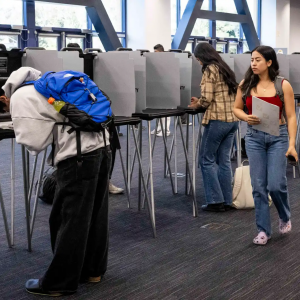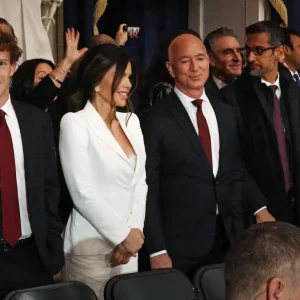
America is under attack from enemies we’ve known about for quite some time now.
In the year 2000, the United States was able to declare that measles had officially been eliminated from the country. Fast-forward 14 years later, the United States is caught up in the throes of one of the largest measles outbreaks in recent history. In 2014, the U.S. experienced 23 measles outbreaks in 27 different states for a total of 668 cases. Moreover, mumps, whooping cough, and chickenpox have all made reappearances in recent years as well. Americans have unparalleled access to arguably the best medical centers and research facilities, yet we are still under attack from diseases most common in developing countries. By implementing policies at the statewide level that seek to educate people about the benefits of vaccines and mandate their usage, the United States can work toward ending the continuous cycle of epidemics. With states such as California, Mississippi, and West Virginia taking strides early to enforce high vaccination rates, other states should follow suit and pursue legislation that prioritizes public safety. In Mississippi this initiative has largely been successful, raising the vaccination coverage rate to 99.7%, the highest rate in the country.
The emerging cycle of outbreaks has much to do with two specific groups of people, both seeking non-medical exemptions to avoid vaccinating themselves and their children. Certain religious beliefs and concerns over the safety of vaccines have led to the creation of a growing bloc of parents and celebrities who have taken to boycotting the use of vaccines. 89 percent of parents who avoid vaccinating their children, typically do so by requesting a non-medical exemption, which has almost certainly left vaccination coverage around the country well below what it should be. Thus, personal belief and religious exemptions have allowed for vaccination rates to dip, especially in states where attaining a personal belief exemption requires “nothing more than checking a box of a health form.” With such a simple route to receiving an exemption, parents are not required to acknowledge the benefits that vaccines can provide, perhaps allowing many of the misconceptions surrounding the safety of vaccines to persist. The CDC reports that vaccines typically produce immunity for a person between 90 percent and 100 percent of the time they are administered. This is simply one of many benefits that can be lost for a child who forgoes receiving vaccines.
Offering philosophical exemptions has become an issue due to the way it has indirectly contributed to the massive outbreaks in recent years. A report by the University of Oxford recommends a roughly 95 percent vaccination rate to maintain herd immunity and protect the community from outbreaks, particularly of diseases that spread quickly, such as measles. Despite widespread access to such an empirically effective resource, fourteen states have kindergarten vaccination rates that are multiple percentage points below this threshold, and nearly 20 other states are located either slightly above or slightly below that margin.
With the medical community unable to assure certain parts of the population of the safety and necessity of vaccines, it seems that a legal approach may be necessary to raise coverage rates and protect the population. While parents undeniably have the right to make decisions about their child’s well-being, when it comes to vaccines, the impact of the decision that a parent makes is not simply limited to his or her own child. More specifically, if an unvaccinated child falls sick and becomes a health hazard to the his or her peers at school, the parents of the other children no longer retain the same ability to protect their children. The Supreme Court recognized this dilemma when it decided in 1905 in the ruling of Jacobson v. Massachusetts that “it was the duty of the constituted authorities primarily to keep in view the welfare, comfort and safety of the many, and not permit the interests of the many to be subordinated to the wishes or convenience of the few.” If state lawmakers take the initiative to prohibit non-medical exemptions for the sake of public safety, the United States could reach a universal vaccination coverage rate high enough to permanently eradicate many preventable diseases.
In regards to those who refuse to vaccinate their families due to religious beliefs, the court decided in 1944 that “The right to practice religion freely does not include liberty to expose the community or the child to communicable disease or the latter to ill health or death.” Though civil liberties are of primary importance, the social contract as argued by John Locke is based on the principle that the people ought to “conditionally transfer some of their rights to the government in order to better ensure the stable, comfortable enjoyment of their lives, liberty, and property.” This is especially relevant because today, it is important to keep public health in mind as the prerequisite to policy creation for the sake of protecting lives.
For those with weakened immune systems or medical issues–cancer patients for example–a disease as common as the flu can be fatal. Those who refuse to vaccinate themselves or their children, risk bringing about outbreaks that could be fatal to an unprotected subset of the population. The New York Times reports one such instance: “Carl Krawitt, whose 7-year-old son, Rhett, is in remission from leukemia and was medically prohibited from receiving vaccines, argued that it was children like his son whose rights were being violated by those who refuse to vaccinate; unvaccinated children could pass along potentially deadly diseases to Rhett.” Parents such as Carl Krawitt echo the sentiments of the Supreme Court as well as those of parents concerned about the health risks associated with allowing their children to interact with unvaccinated children on a daily basis.
Acting on this issue requires many steps, but it starts with lawmakers recognizing the duty they have to the public to prioritize the safety of the communities they represent. Primarily, it requires policymakers to examine what can be done to increase vaccination rates voluntarily through means such as educating the population on the importance of vaccines or clarifying misconceptions regarding the drawbacks of vaccines. If voluntary measures do not achieve the goal of promoting communal welfare, it may be necessary for lawmakers to weigh the impact of stricter vaccination laws, similar to the ones that exist currently in Mississippi, California, and West Virginia.





